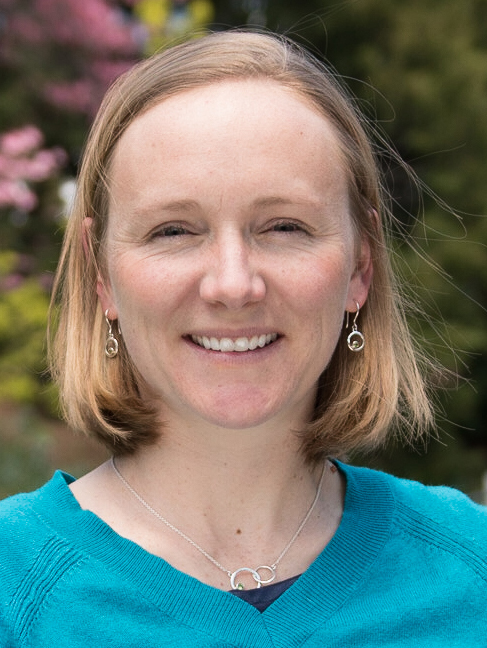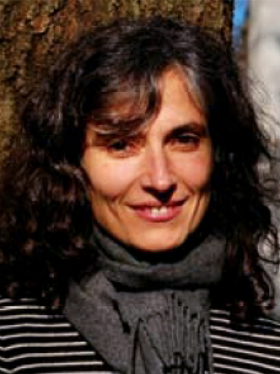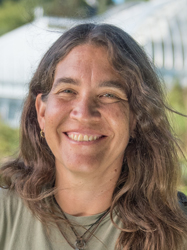Teaching Award Winners Share Insights
News of Note
Published October 18, 2021
“Caring,” “curious,” “engaging,” “devoted”: These are just some of the ways their student nominators describe the three faculty members who are recipients of this year’s Sherrerd Teaching Awards.
The 2021 honorees—Maren Buck, associate professor of chemistry; Gaby Immerman, senior laboratory instructor in biological sciences; and Michelle Joffroy, associate professor of Spanish and Portuguese—are “role models” who have helped change the way their students experience the world.
The three award winners will be recognized at a ceremony on Tuesday, Oct. 26, at 4:30 p.m. in Sage Hall, Sweeney Concert Hall. The celebration is open to students, faculty and staff who are participating in Smith’s asymptomatic testing program. People not in Smith’s testing program can watch the event via livestream on the college’s Facebook page. (Viewers do not have to have a Facebook account to access the livestream).
The Kathleen Compton Sherrerd ‘54 and John J. F. Sherrerd Prize for Distinguished Teaching is awarded annually to faculty members who have elevated teaching to the highest levels of art and science at Smith.
Here are some insights this year’s honorees shared about being educators:
What led you to become a teacher?
 Maren Buck: “I attended a small liberal arts college—the University of Puget Sound in Tacoma, Washington—where I got to know my chemistry professors really well. They seemed to love what they did, both in the classroom and in the research lab, and their passion inspired me to pursue a career as a teacher-scholar. I started out in college thinking I would be a biology major and go to medical school. Of course, I had to take two semesters of organic chemistry. I was terrified because I’d heard the subject was so hard. But I found that I absolutely loved it—the problem solving and creativity it involved. I also had a really engaging professor who made learning fun. He is one of the primary reasons I’m doing what I’m doing today.”
Maren Buck: “I attended a small liberal arts college—the University of Puget Sound in Tacoma, Washington—where I got to know my chemistry professors really well. They seemed to love what they did, both in the classroom and in the research lab, and their passion inspired me to pursue a career as a teacher-scholar. I started out in college thinking I would be a biology major and go to medical school. Of course, I had to take two semesters of organic chemistry. I was terrified because I’d heard the subject was so hard. But I found that I absolutely loved it—the problem solving and creativity it involved. I also had a really engaging professor who made learning fun. He is one of the primary reasons I’m doing what I’m doing today.”
Gaby Immerman: “Although my mother and grandmother were both teachers, I fell sideways into teaching through my pursuit of a career in public horticulture. In the summer of 2000, I sent an inquiry to the director of the Smith Botanic Garden, asking whether there were any gardener positions available. To his credit, he felt my professional experience working on farms, in community gardens, as a landscaper and in public horticulture settings would serve me well as a facilitator of hands-on learning for students. And he was right! That realness is one of the core qualities of my teaching and course design that students respond to the most.”
 Michelle Joffroy: “In college I was immersed in different kinds of activism related to immigrant women’s rights. At the same time, I was studying post-colonial and anti-imperialist feminisms at the University of Massachusetts. I was fortunate to have really strong women mentors in college, who encouraged me to connect my activist and intellectual knowledge. At the end of my senior year, they nominated me for a Mellon Fellowship in the Humanities to pursue a Ph.D. When I was awarded the fellowship, all those paths and the women who accompanied me on them suddenly converged: I was going to be an educator!”
Michelle Joffroy: “In college I was immersed in different kinds of activism related to immigrant women’s rights. At the same time, I was studying post-colonial and anti-imperialist feminisms at the University of Massachusetts. I was fortunate to have really strong women mentors in college, who encouraged me to connect my activist and intellectual knowledge. At the end of my senior year, they nominated me for a Mellon Fellowship in the Humanities to pursue a Ph.D. When I was awarded the fellowship, all those paths and the women who accompanied me on them suddenly converged: I was going to be an educator!”
What is a key life lesson you learned, and where did you learn it?
Maren Buck: “Focus on the process and not the outcome. I learned this one from my mom. To me, this means focusing on the process of completing a task rather than on the outcome of that task. For example, as a student I tried to focus on learning and engaging with class material rather than on the grade I might get on a class assignment. It’s really stressful to worry about grades, and I think it detracts from one’s ability to actually learn the material on a deep level. If you focus on the process, the outcome—whatever that may be—will happen in the best way that it can.”
What has been your experience been teaching during the pandemic?
 Gaby Immerman: “As you might imagine, the subject of horticulture doesn’t translate easily to the online environment. And yet, necessity is the mother of invention. Instead of us all learning together on campus [in 2020], I created a new framework of guided independent inquiry, where students could learn about their communities wherever they were and connect with plants in their own backyards. It was a valuable insight to realize how the previous course model had privileged the New England landscape and plant palette, when the course’s essence is really to teach students to see and relate to plants wherever they find themselves.”
Gaby Immerman: “As you might imagine, the subject of horticulture doesn’t translate easily to the online environment. And yet, necessity is the mother of invention. Instead of us all learning together on campus [in 2020], I created a new framework of guided independent inquiry, where students could learn about their communities wherever they were and connect with plants in their own backyards. It was a valuable insight to realize how the previous course model had privileged the New England landscape and plant palette, when the course’s essence is really to teach students to see and relate to plants wherever they find themselves.”
What do you like best about teaching at Smith?
Michelle Joffroy: “I learned how to be a teacher here. If I have grown and become a better teacher and scholar it’s because I have found friends and colleagues across campus—faculty, staff and students—as well as in the surrounding community, who believe in solidarity, in collaboration and in building collective knowledge. I appreciate having the resources and the freedom to work with people who are willing to take risks across disciplinary boundaries; to let go of the notion of the single expert and learn in new, collective ways. And of course, mis estudiantes, que son el corazón ya la inspiración para seguir imaginando, colaborando y creando un mundo en el que quepan muchos mundos.”
